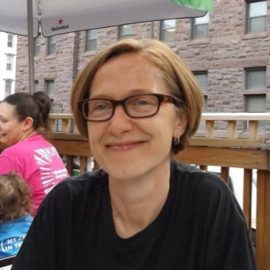How my story begins: I had just graduated from UT-Austin with a Ph.D. in Sociology and started a tenure-track appointment at Mary Washington College. I had health insurance for the first time in my adult life. I became very sick during the 1998-99 academic year. I was severely fatigued and experiencing intermittent abdominal and back pain. In between classes, I remember lying on the floor of my office trying to breathe through the cramping and calm myself. I would sometimes wake in the night doubled over in agony. My general practitioner, remarking that I was "young and healthy," assumed I had an exercise-induced injury and sent me to six weeks of physical therapy.
When the issue did not resolve with physical therapy (in fact it got worse), I sought out another physician. My first visit was with a nurse practitioner working in the office and she genuinely listened to me. Upon palpating the area of my pelvis from which the pain seemed to be radiating, she felt a mass. Ultrasound and a subsequent CT scan revealed a 6cm tumor in the lymph nodes on my pelvic wall. I was initially given a CUP (Cancer of Unknown Primary) diagnosis. Because I had had an abnormal Pap test and subsequent cryosurgery when I was 22, and the tumor was a squamous cell carcinoma, the oncologist to whom I was referred diagnosed it as cervical cancer. It was an 'odd case' he said because I had gotten a Pap test every six months for a couple of years and once a year after that and all of them had been normal. My oncologist said I probably should have had a cone after the abnormal Pap and that some cells must have 'migrated' to the lymph nodes where they took up residence and started to grow.
How I felt after diagnosis: As the doctor began to talk about my diagnosis, I suddenly felt as if a door had opened up to my right and I was quietly ushered into a parallel universe. Her voice became more and more distant and her words muddied. I just kept thinking, "I am going to die." Honestly, I'm not sure I ever quite returned from that parallel, liminal space.
Telling my family and friends: I couldn't actually tell my family and friends. That burden fell to my then-husband who took up all responsibility for communicating with friends and family. He became my intermediary and managed phone calls and visits according to what I could handle each day. In the beginning, I just couldn't cope at all. As time wore on, I felt like I could only cope with myself and not others. I was able to put on a cheery, hopeful self in very short bursts, and I did just that for medical appointments and visits with friends and family. Even that became exhausting. I remember one notable meltdown I had in the radiation clinic near the end of my treatment when the facade cracked wide open.
My treatment: I underwent a lengthy surgery in June 1999 to remove the tumor in my lymph nodes. The day after, my surgeon stopped by to check on me and told me that when he'd opened my abdomen and saw the mess of cancer in my pelvic region, he nearly sewed me right back up again. I'm so glad he did not. In August 1999, I began concurrent rounds of daily pelvic radiation and weekly chemotherapy. I was scheduled for three weekends of internal radiation (brachytherapy), spaced throughout my treatment. This was an in-patient procedure where I was lying prone on my back with radiation pellets in my cervix in quarantine for 36 hours. The first two brachy sessions were so traumatic, I begged my oncologist not to make me do the third. My birthday was coming up and I wanted the nightmare of treatment to be over. I was sick and exhausted and dispirited. He agreed, saying they had "hit" me "so hard" with the rest of the protocol that one last round of brachy wouldn't make that much of a difference. After my last day of treatment (no fanfare as I left the hospital), my then-husband asked me where I wanted to go. I said I wanted to see the ocean. Without hesitation, he drove me to the oceanfront in Virginia Beach and I spent a quiet hour or so staring out to sea.
How I felt after treatment: Recovery from the ravages of radiation and chemotherapy was extremely slow-going and, one could argue, never really complete.
What I did to help myself: What helped me most was hiking, yoga, and meditation. I also find solace in writing, but could not bring myself to write about my cancer for many years.
Where I am today: Today I am savoring each breath of every day, with all the messiness that this beautiful world continues to bring.
What I want other women to know: You are not alone. You have a vast community of Cervivors on whom you can rely as you go through whatever treatment may be necessary to confront the disease. You deserve the best health care available and to be treated with dignity and respect, regardless of your social background. You should never feel shame about having HPV or cervical cancer.
How I will try to help others: I am so grateful to have found Cervivor and have dedicated what time I can to being an advocate for people with HPV and cervical cancer here in Richmond, Virginia and hope to engage with national efforts as well. I am also very keen to connect with the global movement, particularly in Latin America.
Any additional information you'd like to share: We work in honor of those who have suffered and those who have died. We work in the hope that fewer people will know such pain and that, eventually, one day we will eradicate cervical cancer.
